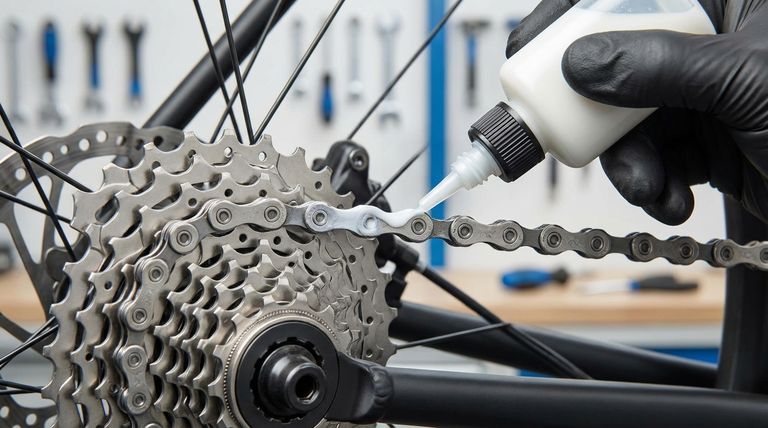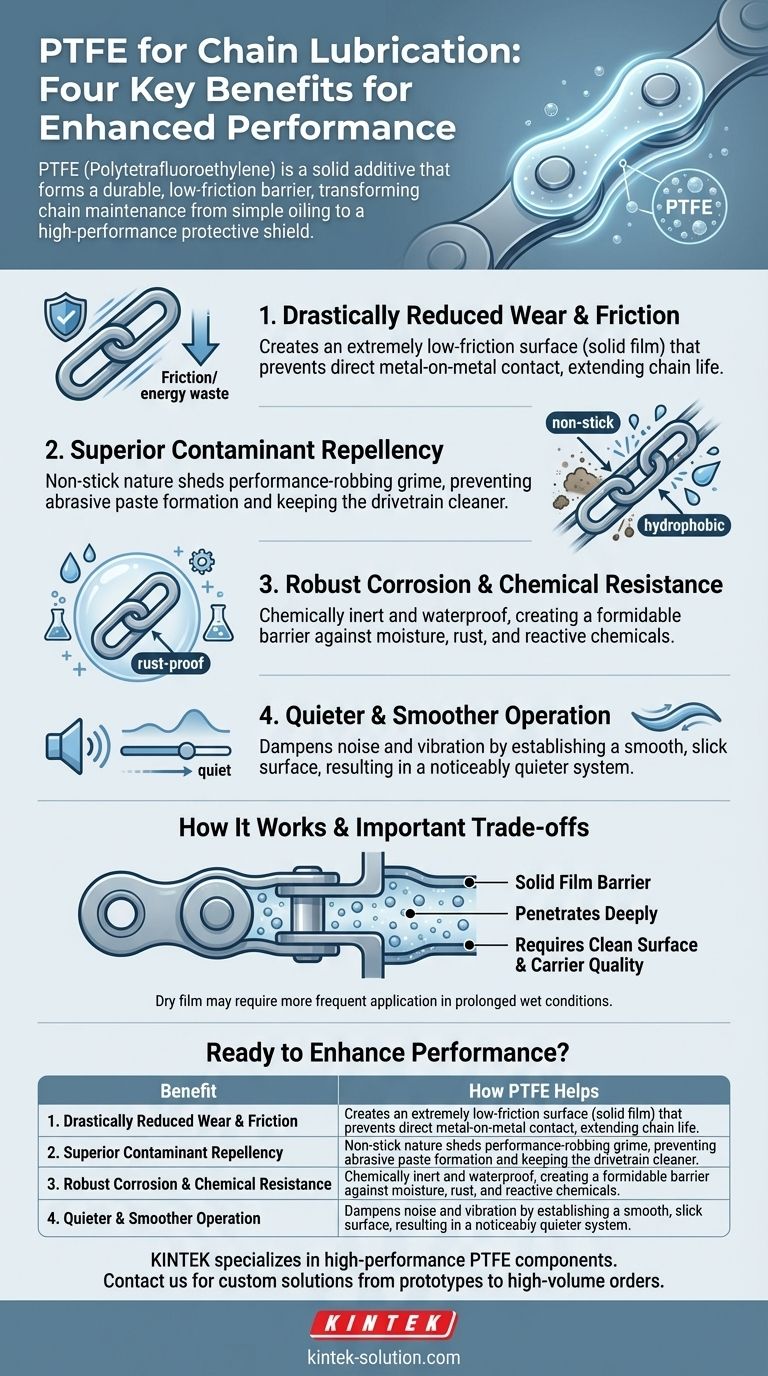To put it simply, PTFE (Polytetrafluoroethylene) provides four primary benefits for chain lubrication: it creates an extremely low-friction surface that reduces wear, its non-stick nature repels performance-robbing dirt and dust, it offers excellent corrosion resistance against moisture, and it significantly quiets the entire drivetrain.
The core advantage of PTFE isn't that it's just another liquid lubricant. It is a solid additive that physically bonds to the chain's surfaces, creating a durable, dry, and slick barrier that protects the metal from both itself and outside contaminants.

How PTFE Transforms Chain Performance
Understanding PTFE's benefits requires looking beyond traditional "wet" lubricants. PTFE, often known by the brand name Teflon, functions as a solid film that fundamentally changes the surface properties of your chain.
The Core Principle: A Solid, Low-Friction Barrier
PTFE has one of the lowest coefficients of friction of any known solid material. When suspended in a carrier fluid (like a wax or synthetic oil), it can penetrate the deep recesses of a chain's pins and rollers.
As the carrier evaporates, it leaves behind a protective film of these microscopic PTFE particles. This film creates a solid, self-lubricating layer that prevents direct metal-on-metal contact.
Benefit 1: Drastically Reduced Wear and Friction
The primary job of a lubricant is to reduce friction. By coating the chain's moving parts, the PTFE film allows links and rollers to glide over each other with minimal resistance.
This translates directly to less energy wasted and a longer operational life for both the chain and the sprockets it engages with.
Benefit 2: Superior Contaminant Repellency
This is where PTFE-based lubricants truly stand out from traditional wet oils. The surface created by PTFE is non-stick and hydrophobic (water-repelling).
Instead of attracting dust, dirt, and grime to form an abrasive "grinding paste," a PTFE-coated chain actively sheds these contaminants. This keeps the drivetrain cleaner for longer, which is a critical factor in preventing premature wear.
Benefit 3: Robust Corrosion and Chemical Resistance
PTFE is chemically inert, meaning it is highly resistant to reactive chemicals. More importantly for a chain, its waterproof nature creates a formidable barrier against moisture.
This protection is essential for preventing rust and corrosion, especially in wet or humid operating environments.
Benefit 4: Quieter and Smoother Operation
Chain noise is largely a product of friction and vibration between its hundreds of moving parts.
By establishing a smooth, low-friction surface between these components, a PTFE film effectively dampens this noise, resulting in a noticeably quieter and smoother-running system.
Understanding the Trade-offs
While highly effective, PTFE-based lubricants are not a universal solution without considerations. Understanding their application requirements is key to achieving the best results.
The Importance of the Carrier Fluid
PTFE is an additive, not the entire lubricant. The quality of the carrier—be it a wax, synthetic oil, or other solvent—is crucial. A poor-quality carrier will fail to deliver the PTFE particles deep inside the chain's rollers where lubrication is most critical.
Application Requires a Clean Surface
For the PTFE film to bond properly to the metal, it must be applied to a completely clean and degreased chain. Applying it over an existing layer of dirty oil will severely limit its effectiveness and durability, as the particles will stick to the dirt, not the chain.
Durability vs. Conditions
A dry film of PTFE may require more frequent reapplication than a heavy, viscous wet lube, particularly in prolonged wet conditions where the film can eventually be washed away. The trade-off is superior performance and cleanliness between applications.
Making the Right Choice for Your Goal
Selecting a lubricant depends entirely on your operational goals and environment.
- If your primary focus is maximum efficiency in clean conditions: A PTFE-based dry lubricant is ideal, as it offers the lowest friction without attracting any airborne dust.
- If your primary focus is performance in dirty or mixed conditions: A PTFE-fortified lubricant provides a crucial advantage by shedding contaminants and preventing the formation of abrasive paste that destroys drivetrains.
- If your primary focus is all-weather corrosion protection: A lubricant with PTFE provides a resilient, water-repelling barrier that protects against rust far better than simple oils.
Ultimately, using a PTFE-enhanced lubricant transforms chain maintenance from merely applying oil to coating it with a high-performance protective shield.
Summary Table:
| Benefit | How PTFE Helps |
|---|---|
| Reduced Wear & Friction | Creates a solid, low-friction barrier between moving parts. |
| Superior Contaminant Repellency | Non-stick, hydrophobic surface sheds dirt and dust. |
| Robust Corrosion Resistance | Provides a waterproof, chemically inert barrier against rust. |
| Quieter Operation | Dampens noise by minimizing friction and vibration. |
Ready to enhance your chain's performance with precision PTFE technology? KINTEK specializes in manufacturing high-performance PTFE components for demanding applications in the semiconductor, medical, laboratory, and industrial sectors. Our expertise in custom fabrication ensures you get the exact solution you need, from prototypes to high-volume orders. Contact us today to discuss how our PTFE solutions can benefit your equipment!
Visual Guide

Related Products
- Custom PTFE Parts Manufacturer for Teflon Parts and PTFE Tweezers
- Custom PTFE Parts Manufacturer for Teflon Containers and Components
- Custom PTFE Teflon Balls for Advanced Industrial Applications
- Custom PTFE Sleeves and Hollow Rods for Advanced Applications
- Custom PTFE Measuring Cylinders for Advanced Scientific and Industrial Applications
People Also Ask
- What are the future considerations for machining Teflon? Mastering Material Challenges with Smart Tech
- What are the best practices for achieving tight tolerances in Teflon (PTFE) machining? Master Precision for Demanding Applications
- What are the key considerations when machining Teflon? Master Precision Machining for Soft Polymers
- Why is CNC machining preferred for Teflon parts over other methods? Unlock Precision & Complex Designs
- What are the main advantages of using PTFE parts in industrial applications? Unlock Unmatched Chemical Resistance and Reliability



















